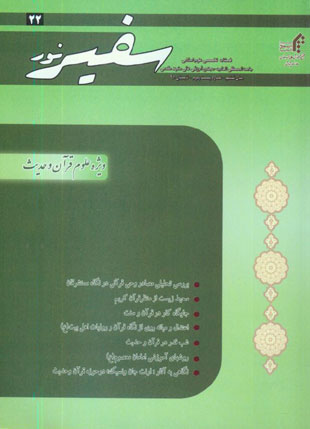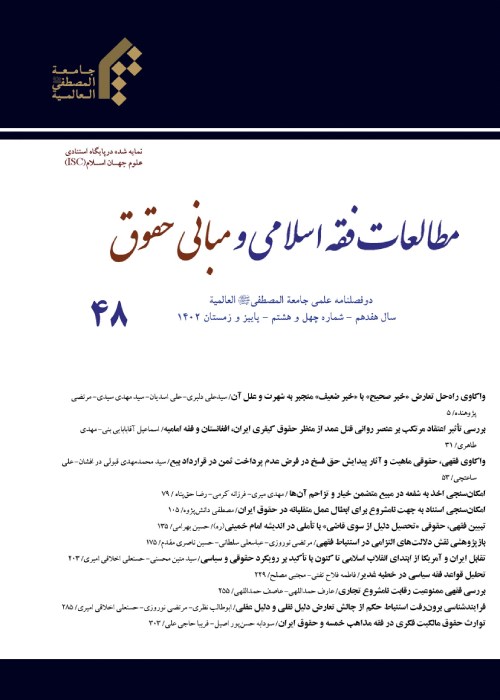فهرست مطالب

نشریه مطالعات فقه اسلامی و مبانی حقوق
پیاپی 22 (تابستان 1391)
- ویژه علوم قرآن و حدیث
- 184 صفحه،
- تاریخ انتشار: 1391/08/10
- تعداد عناوین: 8
-
صفحه 3
-
صفحه 29
-
صفحه 39
-
صفحه 85
-
صفحه 117
-
Page 5The orientalists have been studying the possible similarities of the Holy Quran with other books and Holy Scriptures for consecutive centuries. They were after finding possible signs of impressibility of the Holy Quran by the environment and the way of thinking of Arabian Peninsula during that time or other popular religion like Christianity and Judaism or the impressibility of it by previous cultures and religions like the religion of Abrahamic faith (Hanif), Zoroastrianism (Zardosht), Sa’abe’e and etc. So by reviewing the text of the Holy Quran, they tried to find some possible signs for the basis of their logical reasoning. In this article, the writer, has gone over the basis of the orientalists and their enquiries and has tried to resolve them.Keywords: Quran, Orientalists, Basis, Torah, Gospels, Abrahamic Faith (Hanif), Saabee
-
Page 29Holy Quran is the main source and the most important one in defining the value of nature and humanity. Human’s behavior has been proven to be a great threat to nature and its environment. Therefore a change in human behavior becomes a necessity and this change has to be based on ethical values which are environmental friendly or environmental ethics. The environmental ethics, which is a branch of the applied ethics, defines the ethical and spiritual responsibility of human in relationship with his environment. The Holy Quran, while pointing out the divine blessings of nature and telling us to use them, tells us that the violator of the nature is corrupted on earth and it is proscription of the divine blessings and worthy of anger and divine torture. The Holy Quran contains helpful keywords that will guide us towards understanding the nature and its elements and also it will tell us the ethical lectures and the mandatory rights related to the nature. Keywords such as creation, blessing, sign, governing and owning are few examples of those words which will define the Holy Quran’s position in this manner.Keywords: Holy Quran, Ethics, Environment, Religion of Islam
-
Page 39The author has tried to talk about the work and its outcome and results using Quran and traditions and has determined its position and value in the holy religion of Islam. Working and high endeavors are the secrets for growth and improvement of the society and they are the secrets towards the happiness of the soul and they are the way of living of those righteousness servants of the almighty Allah. One of the duties on every human is to choose a job. There is a reciprocal relationship between human and work. The type of the work someone does has great impacts on building his personality. A work that is in proportion with human’s capacities and talents will result in an innovation or inventions. This will lead towards the growth in economy. It also has results for this world such as increase of the reasoning, increase of energy level and an increase in honor and dignity. On the other hand it has some results in the hereafter such as living amongst the prophets and the perfect humans.Keywords: Work, Action, Act, Making Income, Increase of Reasoning, Increase of Energy
-
Page 65For every action there is a limit: we can go over the limit or overdo or overkill it which is called “Ifrat” or underdo it which is called “Tafrit”. The median of these two boundaries is called the medium. Equilibrium and moderateness is the mean of the two limits or the Ifrat and Tafrit. In Islamic sources, they have been used by various words such as: “Ghasd” (intent), “Eghtesad” (Economy) and “Vasat” (Mean). It is to find with a concentrated research that just as the principle of monotheism has been considered in the law giving for all areas such as beliefs, ethics and morals, politics, society and economy fields, also the equilibrium principle or the moderateness has been considered in all of those fields as well. The Holy Quran calls the Muslim Nation as the middle nation or a medium nation and it says:” وَ كذلِ كَ ج علْناكُمَْ أَُمَّة و سطا لَِت كُونُوا شَُ هداء عل ى اَلنَّاسَِ وَ يَ كُو نَ اَلرَّسُولَُ عل يْكُمَْ شهيدا“((Al Baqarah: 365 This verse clearly specifies that in the ordinance of Islam there is no excessiveness, whether in positive or negative, and the Muslim unlike other groups, follow principles that its almighty legislator is aware of all the indigenous needs of human kind and he has considered every aspect of his material and spiritual life.Keywords: Equilibrium, Moderateness, Ifrat, Tafrit, Mean, Act, Economy
-
Page 85One of the important topics of the Holy Quran and the traditions that has a special place and value is the Night of Qadr. Its name has been mentioned many times in the Quran. One of the surah of Quran, 79th one, has been named Qadr which is in titled with this holy and blessed night (Lailato Al-qadr). This night plays a key role and it is very important in defining one’s destiny. That is why it has been the interest of both the Quran and the traditions. In this article, the author has briefly talked about subjects such as: lexical meaning and idiomatic meaning of Qadr, reasoning behind its naming, which night is the holy night of Qadr, why is this night hidden, repetition of it in every year, signs of this night, is it being specifically for the Muslims or for everyone, the value and excellence of this night, suggested actions at this night, role of human in determining his or her future at this night, Quran and the night of Qadr, this night being a firm reason on proving the Imamate and Imam Ali (A.S.) and the night itself.Keywords: Quran, Tradition, Night of Qadr, Fate, Choice, Imamate
-
Page 117The only reliance point of Islam and Muslims, who were seeking truth, during the era of Umayyad and Abbasi’s government, were the infallible Imams (peace be upon them all). They continued the firm path of the prophet (s.a.w) through the darkness of innovations and the horrible deep bloody waves of incidents and continued to strength it without any adornment. The infallible Imams (peace be upon them all) with the necessary tact and reasoning, used different methods that were in coop with the political, social and cultural conditions of their time like lecturing, dictating and writing to educate the religious knowledge to those who did not have the option to hear or understand the voice of Islam in various places and times and with doing so, they burned the boundaries of superstition, altering, fake traditions and rules against the holy ShariaKeywords: Infallible Imams(peace be upon them all), Educational Methods, Lecturing, Dictating, Writing
-
Page 159Orientalism is a field of study dealing with the East, and it is predicated on none Muslims who study about Islam. Orientalism has a long history and it has close ties with Europe and Asia’s relationships as well as the relationship between Islam and Christianity, therefore it is very important. Orientalism gets divided into two parts. If we look at its specific meaning, orientalism has started since the second era of Islam and its most important time goes back to 39th – 42th centuries. This period of time, which is known as the Renaissance in Europe, was the time that science had found a great value and place among people. It is during this time that the greatest orientalists have raised such as Arent Jan Wensinck, who was an orientalist from Netherland. He became famous due to his book named “Mo’ajam Al-fehres Al-alfaz Al-hadith Al-nabavi” (dictionary that gathered words of narrations of the holy prophet of Islam). This book has been criticized by the experts and they have mentioned the cons and pros of it. Arent Jan Wensinck also has written some articles about the Quranic sciences. We will try to introduce him along with his works in this article.Keywords: Orientalism, Orientalist, Quran, Tradition, Lexicography, Arent Jan Wensinck


